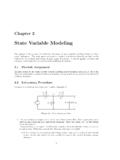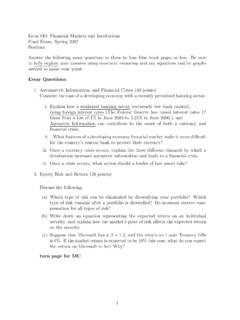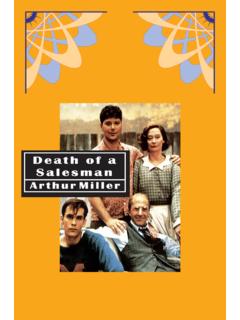Transcription of Myth of Sisyphus - University of Hawaii
1 Camus: The Myth of Sisyphus 1 Albert Camus (1913-1960) gives a quite different account of philosophy and politics of existentialism from that of Sartre. Perhaps the most striking difference from Sartre is his conception of the absurd. For Sartre absurdity belongs to the world prior to activity of consciousness, while Camus s idea of the absurd is closer to Kierkegaard and Nietzsche the absurd is a direct consequence of the absence of God. Without God the discrepancy between human aspirations and the world is acute. The human condition is characterized by the probability of suffering and the certainty of death a fate which human reason cannot accept as reasonable. In the face of this absurdity, the universal reason of the Enlightenment has nothing to say.
2 In The Myth of Sisyphus Camus elucidates this concept of the absurd. The absurd comes with the realization that the world is not rational: At this point of his effort man stands face to face with the irrational. He feels within him his longing for happiness and for reason. The absurd is born of this confrontation between the human need and the unreasonable silence of the world (28). This confrontation is epitomized in The Plague (1947) in the painful death of a child. The arbitrariness of the plague parallels the absurdity of existence. The absurdity of existence raises the question of suicide and the meaning of life thus becomes the only truly serious philosophical problem. The myth of Sisyphus is a potent image of futility. Camus response is that only the lucid recognition of the absurdity of existence liberates us from belief in another life and permits us to live for the instant, for the beauty, pleasure and the implacable grandeur of existence.
3 Lucidity is the clarity and courage of mind which refuses all comforting illusions and self-deception. Lucidity is Camus s notion comparable to Kierkegaard and Sartre s anguish, but in the end Camus is more positive than either Kierkegaard and Sartre. Camus concludes that One must imagine Sisyphus happy. Camus draws the political moral from his confrontation with the absurd in The Rebel (1951) which is an ethic of uncompromising honesty and lucid revolt against absurdity. Its most obvious enemies are found in the stifling atmosphere of conventional bourgeois morality, and more horrifyingly, in totalitarianism, of either fascist or communist varieties. Though a member of the communist party as a youth, Camus became openly hostile to communism, rejecting the idea that the ends can justify the means and the arrogance of philosophies of history which claim to know the end in advance.
4 The Myth of Sisyphus [3] A N A B S U R D R E A S O N I N G Absurdity and Suicide HERE is but one truly serious philosophical problem, and that is suicide. Judging whether life is or is not worth living amounts to answering the fundamental question of philosophy. All the rest whether or not the world has three dimensions, whether the mind has nine or twelve categories comes afterwards. These are games; one must first answer. And if it is true, as Nietzsche claims, that a philosopher, to deserve our respect, must preach by example, you can appreciate the importance of that reply, for it will precede the definitive act. These are facts the heart can feel; yet they call for careful study before they become clear to the intellect. If I ask myself how to judge that this question is more urgent than that, I reply that one judges by the actions it entails.
5 I have never seen anyone die for the ontological argument. Galileo, who held a scientific truth of great importance, abjured it with the greatest ease as soon as it endangered his life. In a certain sense, he did T Camus: The Myth of Sisyphus 2 That truth was not worth the stake. Whether the earth or the sun revolves around the other is a matter of [4] profound indifference. To tell the truth, it is a futile question. On the other hand, I see many people die because they judge that life is not worth living. I see others paradoxically getting killed for the ideas or illusions that give them a reason for living (what is called a reason for living is also an excellent reason for dying). I therefore conclude that the meaning of life is the most urgent of questions. How to answer it? On all essential problems (I mean thereby those that run the risk of leading to death or those that intensify the passion of living) there are probably but two methods of thought: the method of La Palisse and the method of Don Quixote.
6 Solely the balance between evidence and lyricism can allow us to achieve simultaneously emotion and lucidity. In a subject at once so humble and so heavy with emotion, the learned and classical dialectic must yield, one can see, to a more modest attitude of mind deriving at one and the same time from common sense and understanding. Suicide has never been dealt with except as a social phenomenon. On the contrary, we are concerned here, at the outset, with the relationship between individual thought and suicide. An act like this is prepared within the silence of the heart, as is a great work of art. The man himself is ignorant of it. One evening he pulls the trigger or jumps. Of an apartment-building manager who had killed himself I was told that he had lost his daughter five years before, that he had changed greatly since, and that that experience had "undermined" him.
7 A more exact word cannot be imagined. Beginning to think is beginning to be undermined. Society has but [5] little connection with such beginnings. The worm is in man's heart. That is where it must be sought. One must follow and understand this fatal game that leads from lucidity in the face of existence to flight from light. There are many causes for a suicide, and generally the most obvious ones were not the most powerful. Rarely is suicide committed (yet the hypothesis is not excluded) through reflection. What sets off the crisis is almost always unverifiable. Newspapers often speak of "personal sorrows" or of "incurable illness." These explanations are plausible. But one would have to know whether a friend of the desperate man had not that very day addressed him indifferently.
8 He is the guilty one. For that is enough to precipitate all the rancors and all the boredom still in But if it is hard to fix the precise instant, the subtle step when the mind opted for death, it is easier to deduce from the act itself the consequences it implies. In a sense, and as in melodrama, killing yourself amounts to confessing. It is confessing that life is too much for you or that you do not understand it. Let's not go too far in such analogies, however, but rather return to everyday words. It is merely confessing that that "is not worth the trouble." Living, naturally, is never easy. You continue making the gestures commanded by existence, for many reasons, the first of which is habit. Dying voluntarily implies that you have recognized, even instinctively, [6] the ridiculous character of that habit, the absence of any profound reason for living, the insane character of that daily agitation, and the uselessness of suffering.
9 What, then, is that incalculable feeling that deprives the mind of the sleep necessary to life? A world that can be explained even with bad reasons is a familiar world. But, on the other hand, in a universe suddenly divested of illusions and lights, man feels an alien, a stranger. His exile is without remedy since he is deprived of the memory of a lost home or the hope of a promised land. This divorce between man and his life, the actor and his setting, is properly the feeling of absurdity. All healthy men having thought of their own suicide, it can be seen, without further explanation, that there is a direct connection between this feeling and the longing for death. The subject of this essay is precisely this relationship between the absurd and suicide, the exact degree to which suicide is a solution to the absurd. The principle can be established that for a man who does not cheat, what he believes to be true must determine his action.
10 Belief in the absurdity of existence must then dictate his 1 From the point of view of the relative value of truth. On the other hand, from the point of view of virile behavior, this scholar's fragility may well make us smile. 2 Let us not miss this opportunity to point out the relative character of this essay. Suicide may indeed be related to much more honorable considerations for example, the political suicides of protest, as they were called, during the Chinese revolution. Camus: The Myth of Sisyphus 3 conduct. It is legitimate to wonder, clearly and without false pathos, whether a conclusion of this importance requires forsaking as rapidly as possible an incomprehensible condition. I am speaking, of course, of men inclined to be in harmony with themselves.

















